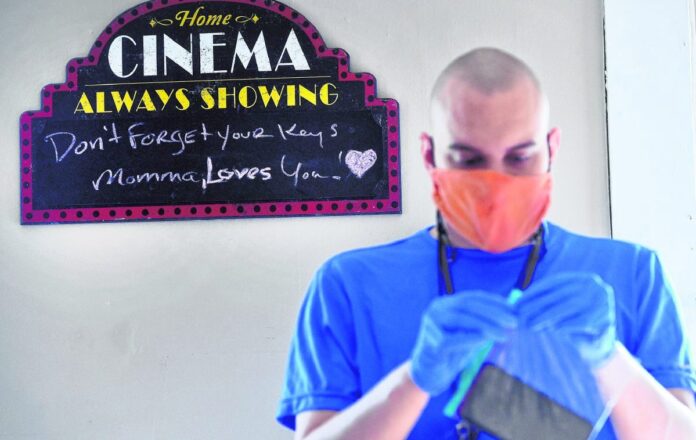
HANCOCK COUNTY — Heading anywhere outside the home has been stressful on just about everyone since COVID-19 hit five months ago. The stress can be especially harsh on those with disabilities.
From autistic adults who struggle to remember safety rules, to the hearing-impaired who can no longer read lips due to masks, it’s certainly an unprecedented time for the special-needs community.
For the past decade, Natalie Evans had attended Bradley United Methodist Church in Greenfield, where her husband, Zach Evans, interpreted the service for her in sign language. Evans is hearing-impaired, and she relies on her husband to help interpret much of the outside world.
[sc:text-divider text-divider-title=”Story continues below gallery” ]Click here to purchase photos from this gallery
An American Sign Language teacher at Southport High School, Evans relies on lip reading to communicate with those who don’t sign. But now, everyone’s lips are covered by masks.
Since that happened, Evans has become even more reliant on her spouse, a sign language interpreter at the same school.
“I know she doesn’t like to go shopping without me because the world is basically silent to her when everyone has a mask on,” said Zach Evans, a Greenfield native who now lives in Greenwood.
“Communication barriers already exist to her, and masks are additional barriers. There is a good and valid reason for the masks, but it puts up barriers to communication for deaf and hard-of-hearing people,” he said.
Transparent face shields also offer certain challenges, since they often reflect light, which makes it harder to read lips, Natalie Evans said.
She’s also tried using a speech-to-text app to understand what people are saying, “but even that has its flaws, in terms of accuracy and availability based on the type of smartphone people use,” she said through email.
Her husband said that masks with clear plastic windows are somewhat scarce and can easily fog up. “That is frustrating since a great number of the clients I work with depend on lip reading or speech cues to fill in the gaps of what they do not hear,” said the interpreter, who now signs for services at a new church closer to home.
For Blake Shoaff of Greenfield, the challenges of living in a world with COVID-19 go beyond the ability to communicate. It can be a struggle to remember the mask, gloves and sanitizer to take along on every trip.
As a 26-year-old with severe autism who lives independently, he loves the chance to grab fast food when he’s out and about with his mom or another caregiver, but the onset of the pandemic has made those trips less common.
His mother, Miriam Rolles, who visits him several times a week, had him spend the first several weeks of the pandemic indoors to protect him from the spreading virus. Now that he’s allowed to venture out, Rolles made a video outlining step-by-step what he needs to do before and after each time he leaves home.
She talks her son through steps like putting on protective gloves, placing his phone in a plastic sandwich bag and putting on his face mask. She also talks him through using hand sanitizer, as well as the steps to take when he gets home — like removing his phone from the bag, slipping off his face mask and gloves, and washing his clothes.
Since he was diagnosed with autism just shy of 2 years old, Rolles has become a fierce advocate for those with autism and other special needs. She’s currently vice president for Arc of Hancock County, a nonprofit which that children with intellectual and developmental disabilities and their families and caregivers.
Last month, the organization had a socially distanced drive-through carnival for the local special-needs community and their caregivers. Guests were invited to drive through to various booths in the Trinity Park church parking lot in Greenfield, where they could play games and win prizes.
It’s just one example of how such organizations are adapting to meet the changing needs of those with special needs in the midst of a life-altering pandemic.
Individuals with disabilities and mental health needs are facing more challenges than ever before, said Sara Cummins, director of Families United For Support and Encouragement, or FUSE.
“We have never stopped empowering families and individuals by supporting, informing and referring by phone, email and social media. In fact, we have made ourselves even more available to provide critical resources during this time,” said Cummins, who has a special-needs child of her own.
“We, the FUSE staff, know exactly what it is like to manage health concerns, work, school and therapies in these demanding times. We are walking right beside the families we are supporting,” she said.
Wearing masks is one of the most unique challenges some children and adults are facing, especially those with sensory issues or health concerns.
The decision of whether to send those kids back to school or to partake in online learning is also especially challenging for parents of disabled kids.
“When you add in medical health and mental health concerns, it is a whole different level of stress and pressure on parents,” Cummins said.
With no end in sight to the pandemic, Rolles encourages caretakers to be vigilant in teaching those with disabilities how to best cope with the ongoing changes and restrictions in a strange new world.
“It will always be my job as his mom, no matter how old he gets, to make sure he understands any steps that can help keep him safe,” she said.



